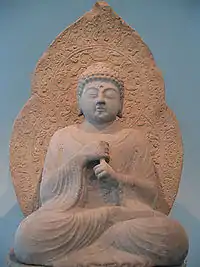Korean sculpture

A Buddhist sculpture from the Silla Dynasty, 9th century AD.
Korean sculpture has a long history.
Ancient Sculpture
Korean sculpture was exported abroad, primarily during the Baekje period, to Japan, where Korean Buddhist sculptures from the seventh century still exist. Main Korean sculptures were generally made of wood, then later stone, and then ceramics, with votive sculptures being the greatest in number. Smaller sculptures were also made using jade, gold and other metals. The greatest Korean sculptures were produced in the time of Korean Buddhist art.
Modern Sculpture
A modern sculpture project that can be mentioned is Greetingman, by Yoo Young-ho.
See also
- List of Korea-related topics
- Korean culture
- Korean art
This article is issued from Wikipedia. The text is licensed under Creative Commons - Attribution - Sharealike. Additional terms may apply for the media files.